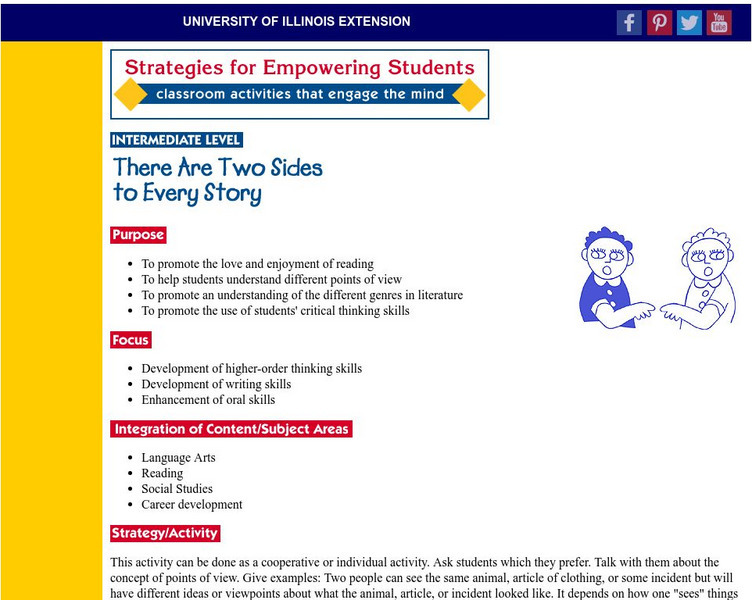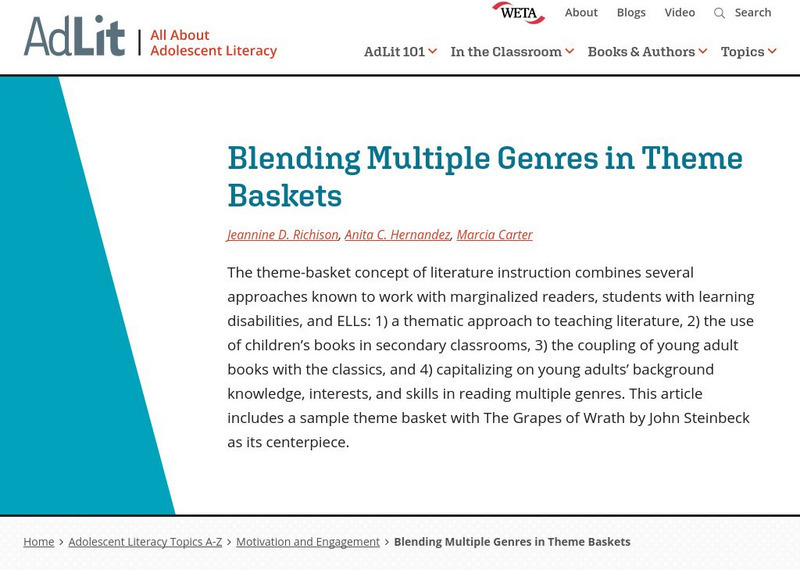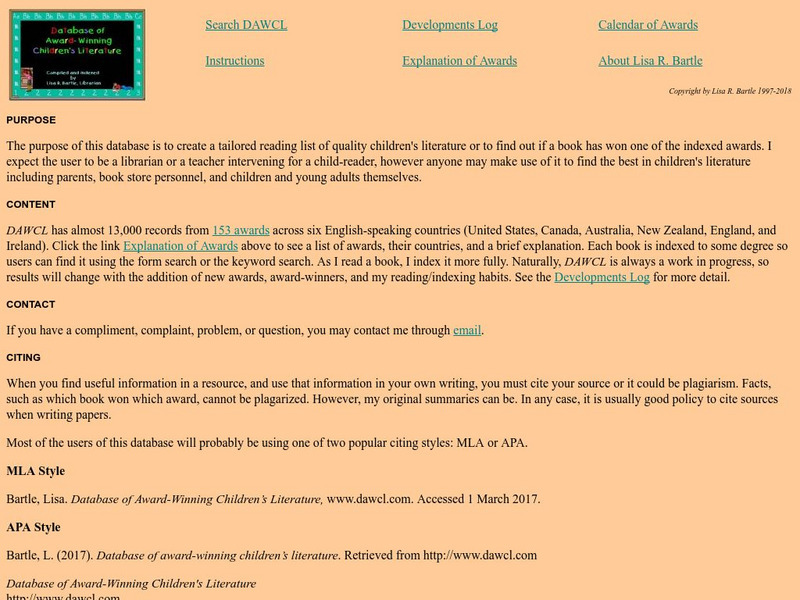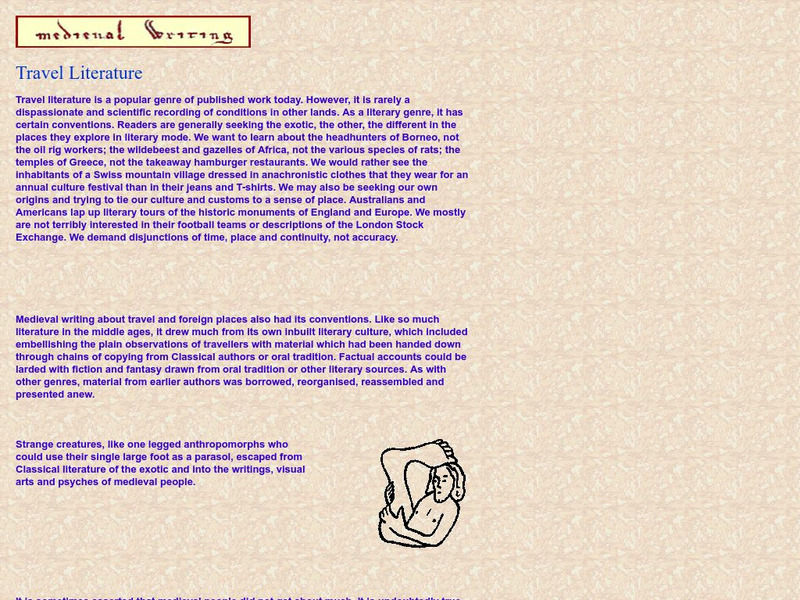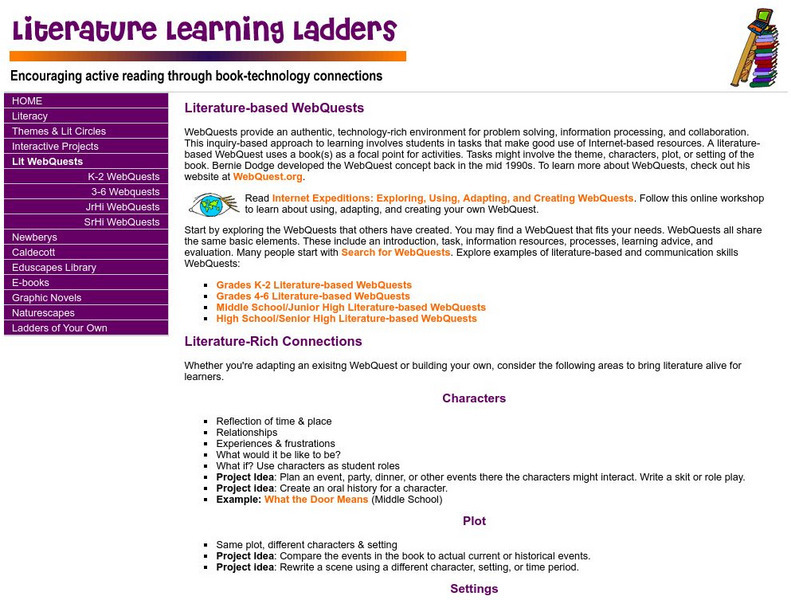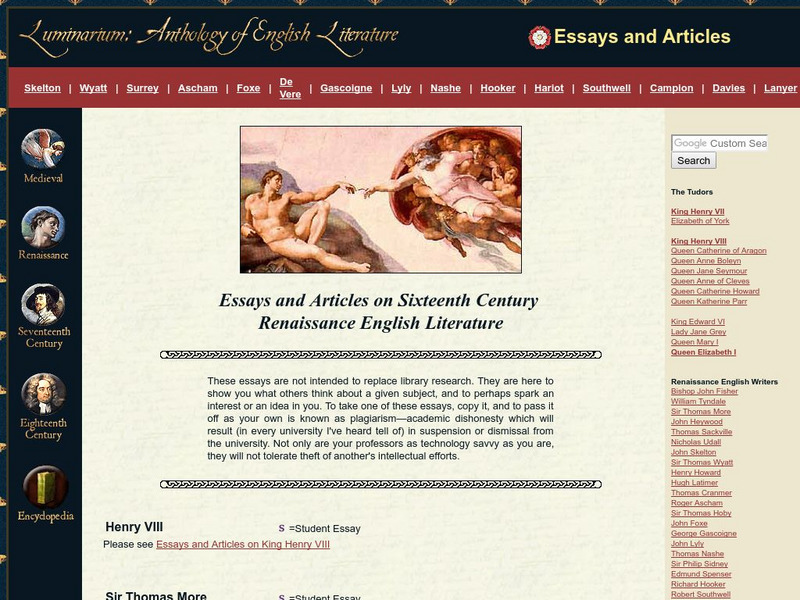Curated OER
Looking Through Lenses
Students explore the various societal and cultural "lenses" which color their perspectives and life experiences by reading the short story "What Means Switch" by Gish Jen. They discuss how the cultural ideas and beliefs affect the...
Texas Education Agency
Texas Gateway: Compare/contrast Themes and Genres in Literary Texts
Determining the theme is not easy; you have to use the clues the author leaves to figure it out yourself. The author implies information about the story through plot points, setting, and characters. You infer and draw conclusions based...
University of Illinois
University of Illinois Extension: Character Education "Two Sides"
Excellent resource for empowering students to become better learners. This lesson includes promoting the love of reading, helping students understand different points of view, different genres in literature, and critical thinking skills....
Texas Education Agency
Texas Gateway: Describe Themes in Literary Texts (English 7 Reading)
[Accessible by TX Educators. Free Registration/Login Required] This lesson is about themes, the central messages in literature. Whatever their genre might be, writers have some wisdom, some universal truth or insight to share; this...
Utah Education Network
Uen: Discovering Ourselves in Literature and Life
This lesson plan, provided by the International Society for Technology in Education (ISTE), encourages students to evaluate literature in a variety of multimedia formats and answer the question, "Who Am I?," Students are then asked to...
Read Works
Read Works: A Wrinkle in Time 6th Grade Unit
[Free Registration/Login Required] This ReadWorks Unit engages students in a deep study of Madeleine L'Engle's science fiction work, A Wrinkle in Time. Students will investigate the following topics: the book's theme, the science fiction...
ReadWriteThink
Read Write Think: What's in a Mystery? Exploring and Identifying Mystery Elements
Contains plans for seven lessons that teach students about the plot structure, character, and setting of the mystery genre. In addition to objectives and standards, this instructional plan contains links to sites used in the lessons as...
AdLit
Ad lit.org: Blending Multiple Genres in Theme Baskets
The theme-basket concept of literature instruction combines several approaches known to work with marginalized readers, students with learning disabilities, and ELLs: 1) a thematic approach to teaching literature, 2) the use of...
Department of Defense
Do Dea: Story, Identity, Unity
Delve into the art of storytelling in this self-guided unit. Multiple topics are covered such as literary genres, the 7 elements of fiction, figurative language, theme, characterization, etc. At the end of the unit, write your own flash...
Other
Database of Award Winning Children's Literature
This is a phenomenal resource. It allows the user to create a reading list of quality children's literature based of choices such as reading level, type of book, genre, ethnicity, gender, etc. In addition, one can determine if a book won...
Other
Personal Site: Travel Literature in the Medieval Period
A nice description of the literary genre known as "travel literature" as it was seen during the Middle Ages in Europe. The author notes that many times, medieval writers would make up exotic creatures to entertain their readers.
Georgia Department of Education
Ga Virtual Learning: Ninth Literature and Composition
This is an introduction to a unit on writing in various genre including Nonfiction, Narrative, Literary Writing, Short Stories, and Poetry. Analysis of "The Odyssey", "To Kill a Mockingbird", "Romeo and Juliet". Click on the View links...
Annenberg Foundation
Annenberg Learner: Artifacts and Fiction: Workshop in American Literature
This workshop, which is divided into eight segments, teaches how to use primary source artifacts from a variety of genres to support the teaching and learning of specific pieces of literature. The genres include visual arts, political...
Other
Literature Learning Ladders: Literature Based Web Quests
A large compilation of high-quality literature-based WebQuests organized by grade range, K-2, 3-6, middle and high (30-50 quests per range). Most relate to specific books; a few explore general themes or genres, e.g., where authors get...
Other
Twentieth Century Poetry in English
The work of many major poets can be reached through links at this site. Includes biographical information on poets and many works.
ReadWriteThink
Read Write Think: Everyone Loves a Mystery a Genre Study
Contains plans for lessons that teach about the mystery story genre, including its story elements and vocabulary. In addition to objectives and standards, this instructional plan contains links to sites used in the lessons as well as...
Luminarium
Luminarium: Essays and Research on the Renaissance
Use this comprehensive site to learn more about English Renaissance Literature. This site is a gold mine of information. It has several essays that illuminate this genre. Find out more about this period in literature through this...
British Library
British Library: Discovering Literature: Print and Perception
Margaret Cavendish and Katherine Philips both wrote across a range of genres and achieved considerable success in their day. This article explores their different approaches to the difficulties of being a 17th-century female writer.
British Library
British Library: Discovering Literature: The Rise of the Novel
This article explains how the novel took shape in the 18th century with the works of Daniel Defoe, Samuel Richardson, Henry Fielding, and Laurence Sterne, and how the book industry responded to the new genre.
British Library
British Library: Discovering Literature: Neoclassicism
Writers and craftsmen including Alexander Pope, John Dryden, Jonathan Swift, and Josiah Wedgwood found inspiration in the classical period. This article explores how their works adopted the style, genres, aesthetic values, and subjects...
British Library
British Library: Strange Case of Dr Jekyll and Mr Hyde: Discovering Literature
Uncover 19th-century connections from Darwin to Jack the Ripper, play a Gothic genre word game, and examine how the novel has been depicted in illustrations, book covers and photographs. [PDF]
British Library
British Library: Discovering Literature: A Close Reading of Chaucer's 'The Merchant's Prologue and Tale'
This article introduces 'The Merchant's Prologue and Tale', exploring the way in which it combines literary genres and traditions, and refuses to give the reader a clear moral or message.
Shmoop University
Shmoop: Julius Caesar Analysis: Literary Devices in Julius Caesar
A discussion of the literary devices used by Shakespeare in The Tragedy of Julius Caesar. Each device is linked to additional pages with more detailed information and examples.
Austin Independent School District
Austin Independent School District: A Taxonomy of Literary Genre [Pdf]
A series of graphic organizers shows the progression of learning about literary genre, beginning in kindergarten and building through to fifth grade.




